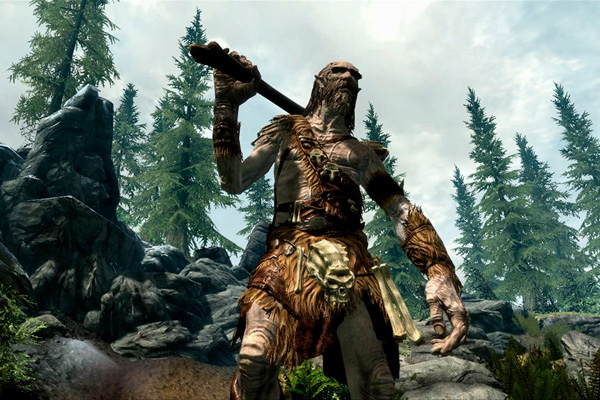Skyrim
The game is set in Skyrim, the northernmost province of Tamriel (where Morrowind and Oblivion took place). Like the previous games, there is a detailed character creation system providing for a plethora of potential characters, ranging from realistic humans, to furry catlike creatures called Kahjiits. However, unlike past games, there is no choice of specific Ďclassí. Your character develops much more organically, gaining proficiency as you practise various skills giving more freedom to the gameplay and a far greater replay value. If you want to play as an Orc firing fireballs from heavily armoured fingers, or as a small wood elf sneaking around wielding a battleaxe twice their size, you can. Moreover, the combat is a stark improvement on previous games, as is the ability to duel-wield spells and weapons to give fluidity to any style of play.
Skyrimís frigid setting evokes a real sense of gravity and impending doom. This is exemplified by the first few minutes of the game where you are taken to a town to be executed, only for it to be attacked by a dragon, or as they are called in the vernacular of Skyrim, ďdovahĒ. The entire town rallies up to fight the hopeless battle, which ends with you, and only one other, escaping alive. After leaving the decimated town, the game does what it does best: leaves you to do what you want. If you want to continue to the beautiful alpine town of Riverwood and fulfill your destiny as dovahkiin (dragonborn), you can. However, if you want to live life as a hunter and part time explorer, or get married and work at the mill, there is nothing stopping you.
There are problems however. The glitches, which marred previous games, remain. It is not uncommon to get stuck behind an inch high ledge forcing a reload, or to see a dragon skeleton thrash permanently after death. At least I expected that from a game so detailed. What really got to me was the laziness of the story. In past games one rose from plebeian to hero after a noticeable struggle. However, in Skyrim there is an unsatisfying sense of immediacy. For example, the leader of a local militia group will not talk to you (let alone trust you) but after one simple quest he is willing to reveal the groupís greatest secret. Likewise the amount of basic (and meaningless) fetch quests is monotonous. The quests themselves often donít feel like they add anything to the development of the tale; rather, they feel like menial chores that you are required to complete before the story can progress.
In this regard you may find that Skyirmís best moments occur when you least expect them. Itís when you are stopped in your tracks by the beauty of the Northern Lights flickering across the plains, or welcomed by the banter flooding the tavern that you realise what a truly fantastic game Skyrim is. Then, when you look at the clock and itís 4am, and you havenít eaten since you started playing hours earlier, you know that youíve been sucked into the Elder Scrolls once again.







